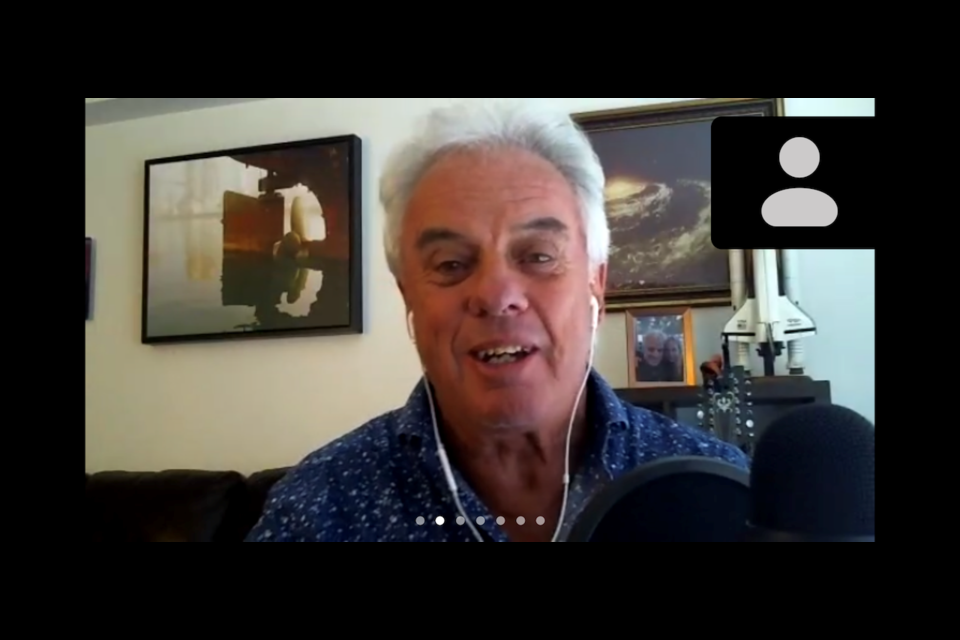Last night about 100 local residents attended the virtual Open House for Orillia’s Climate Future, a public forum to learn more about the city’s climate plan, explain the sources of Orillia’s greenhouse gas (GHG) emissions, and provide an opportunity for the public to share their ideas on climate actions the city and community members can undertake to reduce our carbon footprint.
The event featured a celebrity guest speaker, Bob McDonald from CBC’s Quirks and Quarks. When the Orillia native started his career at CBC in 1977, his first major project was, ironically, focused on climate change.
“There were signs back then that we were putting GHG’s into the air and we should look at this, and it was always in the future," McDonald explained to his virtual audience.
"They would always say it’s going to get warmer, storms are going to get stronger, ice and arctic ice is going to melt, and we need to do something about this. Despite these great conferences where governments get together, we have not met any of the targets that have been set,” McDonald said.
“Everything that was predicted is happening actually faster than the original predictions. It is now in our face, we are seeing it, and I think this year was a turning point.”
McDonald, who lives in British Columbia, experienced first-hand forest fires this summer which has opened his eyes to the need for serious climate action; he says it could start with Orillia.
“The 'sunshine town' can become a solar town, it can become a model for Canada and other towns around the world of how to be more efficient and sustainable by going green because that is the future,” he said.
“I’m confident that we, as the only species who have been able to change the climate, can turn this animal around," said McDonald, who was inducted into Orillia's Hall of Fame in 2014. "We can turn around our technology, we can let it evolve out of the fossil fuel age into the age of clean energy and clean living.”
McDonald suggests Orillia should look at things like solar farms and giving grants for those who would like to power their homes with solar energy.
“Everyone thinks about the giant solar panels that are on roofs or on solar farms that take up a lot of land area, but there are new solar materials that are very thin film and they can actually go in windows, they are transparent," McDonald explained.
"There is paint that is solar so we can have tall buildings that are absorbing solar energy. I’ve seen these projects that are working into the future and are coming down the line,” he said.
Orillia’s Climate Future is currently developing a plan and engaging the public as it works toward a Climate Change Action Plan for the municipality.
During Thursday’s event, community members were given an opportunity to ask questions. One person asked how committed the city is to providing safe travel for bicycles.
Renee Recoskie, the city's manager of property and environmental sustainability, says the city understands that transportation is an important element of the climate.
“We fully expect that actions in that regard will be a part of the plan,” she said.
“I know the city has already taken some great efforts in terms of the multi-modal transportation study, there is also an active transportation committee within the city. So, there are lots of things happening in that regard," said Recoskie.
Recoskie also noted that there will be two new Level 2 electric vehicle charging stations at the Orillia Recreation Centre in the near future.
Another citizen wanted to know clear measurable emission targets will be set by the city.
Naomi Devine, Engagement, Design, and Communications Lead with Sustainability Solutions Group (the consultant hired by the city to help create the climate change action plan), said yes, but noted targets haven’t been set yet.
“We are in discussion about that, and we are also looking at realistically with our area modelling on how we get there, what actions would it take, and to what degree,” she said.
The panel was also asked if the city would be working to reduce the use of natural gas.
Marcus Williams, Modelling Lead with whatIf? Technologies (part of Sustainability Solutions Group team), says it’s something the city is considering.
“We are just getting into the listing and evaluating low carbon actions. I’m pretty sure that will be on the list of considerations,” he said.
“There is a concern that when you take the current volume of natural gas used by a city and then you add the organic waste streams and agricultural waste surrounding it that it's not usually at the same level as replacing all the natural gas," Williams explained.
"Anything that replaces natural gas is like gold, and you want to use that in the hardest-to-replace sectors and then things like low-grade heating, water heating, space heating, they can technically be electrified.”
A final question asked if the city will be taking possible annexation off the table as part of the sustainability plan. Recoskie responded, saying the city is considering the results of recent land needs assessments, but couldn't provide information pending the outcome of those studies.
For more information on the city's Climate Change Action Plan, click here.
